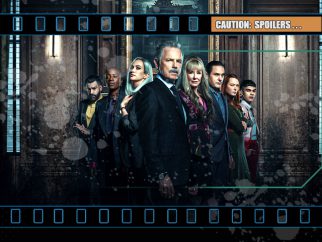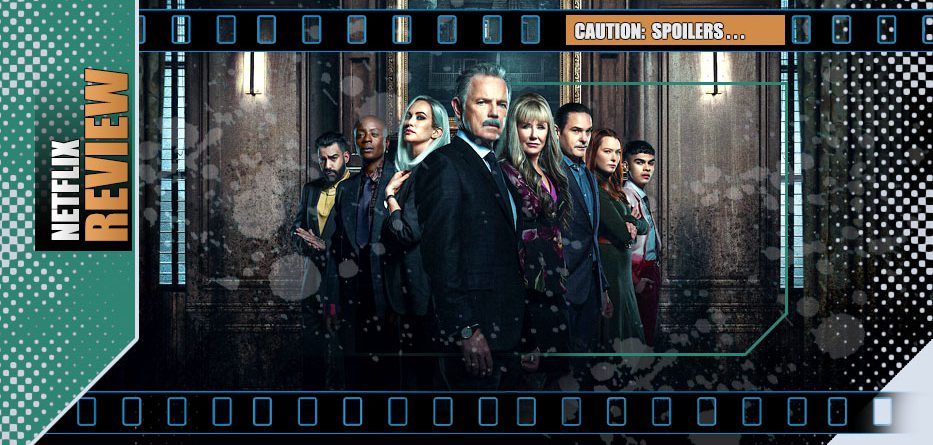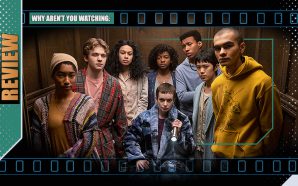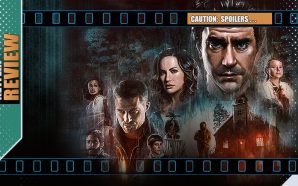Over their long lives, Roderick and sister Madeline Usher have had astoundingly successful careers – they have come from nothing to head an empire with wealth, power, influence and a notorious lack of accountability. Roderick’s children – with several different mothers over the years – have also seemed to excel, famous and infamous in their own respective fields. Thanks to their reach and the lack of scruples of those they employ, it seems they can do anything they want to whomever they want.
But now the Ushers are on trial, their long-standing legal adversary C. Auguste Dupin seemingly having proof of their misdeeds and even intimating that there’s a mole within the Usher empire itself. But Roderick isn’t scared of the courtroom… it’s something far more sinister that seems to be haunting him… and before the trial is done, members of his family begin to die in horrible ways.
So, Roderick finally reveals to Dupin, the true extent of a deal made long ago and its horrific consequences…
*spoilers*
Since the announcement of production, there were high expectations for The Fall of the House of Usher – on two fronts.
Firstly, Mike Flanagan has quickly become the go-to guy for modern horror… or, rather, of top-notch chilling suspense. His The Haunting of Hill House was – and remains – a benchmark in interconnected, puzzle-perfect televisual terror, a chilling but complex story that not only stands up to repeat-viewing but actually gets better. His other work, The Haunting of Bly Manor was good in its own right, Midnight Mass was a brutal takedown of isolationist religion and The Midnight Club was an ‘all-ages’ endeavour that mined adult themes in equally effective ways (and really deserved a second season, which it didn’t get).
Secondly, The Fall of the House of Usher was – of course – a seminal book in its own right, penned by Edgar Allan Poe and one of the legendary cornerstones of unnerving fiction. It seemed like a marriage made in heaven, or perhaps hell, but certainly worth the price of admission to see the result. And, in many ways, that’s definitely the case, though unlike some of his previous productions, Flanagan’s subtle work is significantly less subtle here. Oh, there’s the usual movement in the shadows – what’s quietly going on in his backgrounds is often just as important as the louder foreground – but instead of the quiet, creeping dread that stalked the halls of Hill House and Bly Manor, these are more clinical corridors full of far more overt threats.
The original short story of the same name was just that, an interesting but not lengthy diversion into the macabre, originally published in 1839. Flanagan’s works to date have largely been ‘inspired by’ rather than a slave to the source material and no more so than here. He uses ‘Usher’ merely as a central spine to encase and explore more of Poe’s works, each chapter being a separate ‘rib’ and sinew, largely concentrating on one member of the dynasty and the route to their demise.
Almost every other Flanagan opus you want to binge as quickly as possible… here you’ll appreciate the work and effort but might well feel the need for necessary breaks and pauses to keep you invested in the eight-chapters as you plummet through purgatory on an ever-swirling (if creative) carousel of carnage, rinse/wash repeat…
The problem here – and it’s a significant one – is that there are so few people for whom to root. Even Game of Thrones, Succession and others gave us some sympathy and salve along the way, but almost all the cast of characters are extremes, archetypes and grotesques – to the point of parody – and the momentum is waiting for each of them to fall to temptation and then succumb to a cruel but somehow befitting end. Bruce Greenwood – who took over the role of the elder Roderick after Frank Langella was dismissed over two months into the early 2022 shoot over a series of allegations concerning inappropriate behaviour on set and the existing Roderick scenes had to be reshot – slowly relates those familial fates in flashback. And Flanagan gleefully loosens the reins, happy to charge into battle, to sharpen his blade for both satire and slaughter but losing something of the ‘quiet’ in the presentation. The cinematography is a good as ever with select angles, lighting and mood-setting as you quietly anticipate the tolling of narrative bells. But the horror is more graphic, the corruption endemic, the language more profane and the sleaze knee-deep. Almost every other Flanagan opus you want to binge as quickly as possible… here you’ll appreciate the work and effort but might well feel the need for necessary breaks and pauses to keep you invested in the eight-chapters as you plummet through purgatory on an ever-swirling (if creative) carousel of carnage, rinse/wash repeat.
Flanagan now has almost as an entire repertory company to choose from and many of his regular ensemble are back for return engagements. Henry Thomas, Rahul Kohli , Samantha Sloyan, T’Nia Miller, Kate Siegel (also Flanagan’s wife) and Ruth Codd are just some of the names and faces on show and all bring their A-game to proceedings, clearly relishing the tasks at hand. Bruce Greenwood (with whom he worked on Gerald’s Game alongside Carla Gugino), Carl Lumbly, Mary McDonnell with the young Kyliegh Curran (Flanagan’s The Shining sequel Doctor Sleep) also impress. Willa Fitzgerald and Zach Gilford as the young Madeline and Roderick slither wonderfully and Mark Hammil is deliciously scruple-free as the Usher lawyer. But it’s the versatile Gugino who is the true lynch-pin here – appearing as a variety of characters that both tempts the Usher family individuals and yet often offers them a way out if they can course-correct – an opportunity that they rarely see until too late. It takes a certain calibre of actor to shift so seamlessly between personas and from Angel of Death to dowdy housewife to sardonic security-guard and even an ape, Gugino is clearly enjoying the ability to flex her physical and acting muscles in a way that really should garner her award attention.
The Fall of the House of Usher is intense and ambitious, but it doesn’t quite rise to expectations. It does speak in a all-too-timely way to familial power, money, corruption and empire-level entitlement – with some final episode dialogue being very topical – and eventual retribution. Fans of Poe will smile wryly at the henhouse of unholy easter-eggs, references and nods while more casual viewers may lose out on the reverence and love-letters, but will still be there for the karmic razor-blade evisceration. Yet eight episodes seems to stretch the sinews to breaking point. About 2/3 of the way through, you’ll essentially know what’s happening, where we’re heading and you’ll stick with because of the performances and pedigree. The final episode impresses but has taken too long to get there. While I still will turn up with a ticket, eager for anything in which Mike Flanagan is the creative force, I wish this had been developed as a more compact feature film where the cause-and-effect could have been more potent when viewed over ninety-minutes to two-hours.
I can’t help hoping that the amazingly-talented Flanagan ultimately returns his attentions to the quiet sinister shadows where the true power creeps and seeps, rather than nevermore the howling maelstrom of carnage on show here…

- Story9
- Acting9
- Direction10
- Production Design / VFX9










